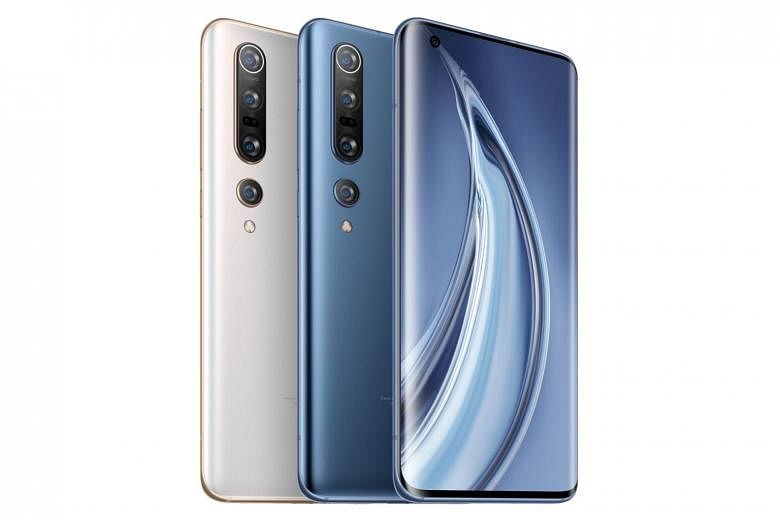5G won't make you sick, but it is probably one of the reasons why the latest flagship smartphones are more expensive than before.
Take the Xiaomi Mi 10 Pro for instance. This top-tier 5G smartphone is priced at $1,399, which seems par for the course - Samsung and Huawei's flagship 5G phones cost $1,898 and $1,448 respectively.
But the Mi 10 Pro costs twice as much as its predecessor, the Mi 9 ($699), which is a significant increase for Xiaomi, a firm that made its name on value-for-money products.
Of course, Xiaomi did not just slap a 5G chipset on the Mi 10 Pro and called it a day. It comes with a quad-camera system anchored by a 108-megapixel (MP) camera, as well as have a bright 90Hz display and is powered by Qualcomm's finest Snapdragon 865 processor.
While Xiaomi previously used the same 108MP sensor in last year's Mi Note 10, the Chinese smartphone maker has improved the camera performance in the Mi 10 Pro.
Notably, the processing time and the noise level for 108MP photos have both been significantly reduced. But I would recommend using the standard photo mode, which produces 27MP photos by combining information from four adjacent pixels into one.
These photos look sharp and retain plenty of detail - I saw that with the texture of tree bark, for instance - while keeping noise at an acceptable level. Colours were accurate with excellent dynamic range.
My only nitpick is that objects at the edges of photos appear softer than expected. Thus, if you do not focus properly on your subject while taking the photo, the subject might not appear as sharp as it should be.
I was also impressed by the dynamic range and colours of photos taken in low-light conditions, which looked truer to life than the photos taken by some competing flagship phones.
The Mi 10 Pro can shoot videos at 8K resolution at 30 frames per second. But given that a short 8s 8K clip is 55MB in size, storage could be an issue, especially as the phone lacks a microSD card slot.
Thanks to its excellent video stabilisation ability, my video turned out steady even while I was jogging during the recording.
At 208g, the Mi 10 Pro feels hefty, though it is narrow enough that I could comfortably grip it one-handed. The build quality is outstanding and the phone feels expensive with Corning Gorilla Glass 5 on both the front and the back.
Its 6.67-inch display is an Oled screen with minimal bezels and a hole-punch selfie camera. This screen looks gorgeous with vibrant colours and supports high-dynamic range videos in Netflix at 1,080p resolution.
Peak brightness is an impressive 1,200 nits, which ensures the content onscreen is visible outdoors in bright daylight.
The display has a 90Hz refresh rate that feels smoother than standard 60Hz variants. While this refresh rate is not quite as impressive as the 120Hz versions offered by its competitors, the 90Hz screen does not consume as much power. You can switch to 60Hz in the settings to further extend the battery life.
Further enhancing its multimedia credentials are the dual speakers, located at the top and bottom edges of the phone. They sound balanced with clear trebles. There was no distortion even at the maximum volume.
Battery life is excellent, too. The Mi 10 Pro lasted me almost two days while I worked from home. In our usual video-loop battery test, it clocked 14hr27min with the screen set to maximum brightness.
Equally impressive was the phone's charging speed - its 4,500mAh battery was fully replenished in less than a hour with the bundled 65-watt USB-C charger, which can also charge a laptop.
The Mi 10 Pro also supports wireless charging and reverse wireless charging, like other top phones.
However, Xiaomi has left out some staple flagship features, such as water or dust resistance (there is no IP certification) and a high-resolution 1,440p screen. In addition, the Mi 10 Pro that is selling in Singapore is the single SIM version instead of the dual-SIM variant, which is unusual for a Xiaomi phone.
Xiaomi's MIUI interface is another potential source of annoyance for Android purists. For one, there is no app drawer. Xiaomi also bundles a number of apps and games that may not be everyone's cup of tea.
But having tried Xiaomi's smartphones over the years, I have seen it shifting gradually to using more of Google's apps, such as Chrome and Gboard, over its own proprietary versions. For instance, swiping right on the Home screen brings up the Google Discover feed instead of a Xiaomi alternative.
The Mi 10 Pro aspires to be a flagship phone, and, for the most part, it succeeds. But the few compromises it makes undercuts its argument to compete with the best in the market. Coupled with the sticker shock from seeing a thousand-dollar Xiaomi smartphone, even its biggest fans may pause when considering the Mi 10 Pro.
FOR
Bright and lively display
Fast wired charging
Good battery life
Excellent stereo speakers
AGAINST
No water or dust resistance
Expensive for a Xiaomi smartphone
1,080p display
No app drawer
SPECS
PRICE: $1,399 (8GB, 256GB)
PROCESSOR: Qualcomm Snapdragon 865 (Single-core 2.84GHz, triple-core 2.4GHz and quad-core 1.8GHz)
MAIN DISPLAY: 6.67-inch Oled, 2,340 x 1,080 pixels, 386 ppi pixel density
OPERATING SYSTEM: MIUI 11 (Android 10)
MEMORY: 256GB, 8GB RAM
REAR CAMERAS: 108MP (f/1.7), 20MP ultra-wide (f/2.2, 117-degree), 8MP telephoto (f/2.0), 12MP telephoto (f/2.0)
FRONT CAMERA: 20MP (f/2.0)
BATTERY: 4,500mAh
RATING
FEATURES: 4/5
DESIGN: 4.5/5
PERFORMANCE: 5/5
VALUE FOR MONEY: 4/5
BATTERY LIFE: 5/5
OVERALL: 4/5


